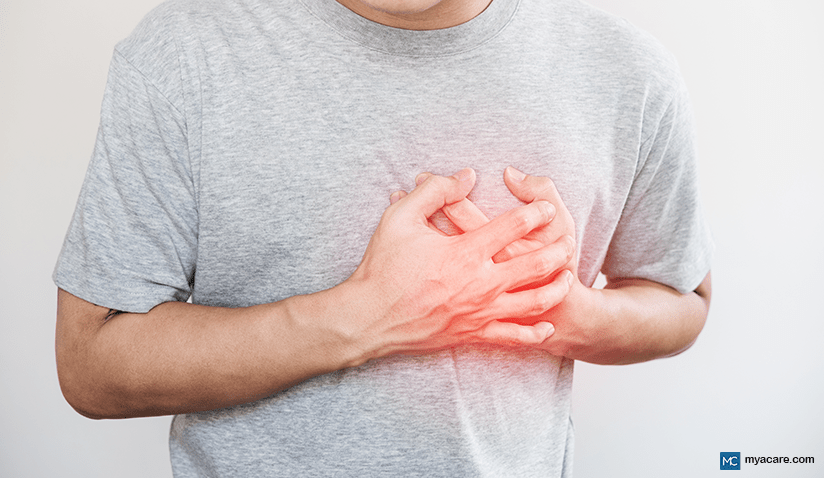8 WAYS TO DEAL WITH ACID REFLUX

You might have experienced the unpleasant feeling of acid regurgitation one or more times in your life, probably after eating a heavy meal. You may have also felt some chest burn during those times, making you regret that delicious dinner you’ve just eaten. If this happens to you frequently, you might have gastroesophageal reflux disease (GERD), or “acid reflux” for short.
Acid reflux may cause those affected a great deal of discomfort, and the condition might persist despite the many different available off-the-counter drugs treating it. The good news is, changing some lifestyle habits and avoiding certain foods can go a long way in reducing acid reflux symptoms and maybe prevent them altogether.
First, why does acid reflux happen?
The stomach produces gastric acid to digest food and its walls are protected by special mechanisms to prevent them from being damaged by acid. A muscular ring called the lower esophageal sphincter (LES) closes the stomach at its inlet, preventing acid from going back upwards. When the LES is weak or relaxes abnormally, acid might go up, causing irritation in the esophagus and the related symptoms of GERD.
What are some ways to reduce acid reflux symptoms?
1. Avoid overeating
The lower esophageal sphincter normally closes the stomach and prevents food and acid from backwashing into the esophagus. Eating large amounts of food can distend the stomach (think of it like a balloon being inflated) pressing harder against an already dysfunctional sphincter, leading to its incomplete closure and eventually acid reflux. Try to cut down the size of your meals and stick to smaller (and, maybe, more frequent) portions to try and reduce your reflux symptoms.
2. Lose some weight
Being overweight or obese is a risk factor for acid reflux. Obesity is implicated as a risk factor for many other health conditions like diabetes, heart disease, hypertension, and others as well. A large belly will press against your stomach, squeezing the contents out through the LES, leading to acid reflux. In some obese people, the high pressure in the abdomen may also push part of the stomach above the diaphragm, making it easier for acid to pass backward. This is considered one of the most important mechanisms of acid reflux in obese patients.
Losing weight and aiming for the ideal number is a great investment in reducing acid reflux with the added benefit of protecting against the numerous serious diseases caused by obesity.
You can follow a balanced diet and maybe perform aerobic sports more frequently. Seeking the help of healthcare professionals to adjust your diet can also be worthwhile.
3. Avoid trigger foods
Acid reflux can happen at any time, however, most people experience it directly after eating specific foods. Foods like tomatoes, garlic, mint, onions, and chocolate can all trigger acid reflux by either relaxing the LES or directly irritating the esophageal wall. Spicy and fatty foods are also implicated in causing this condition. Each person is usually different and certain foods that cause reflux in one person may be perfectly tolerated by another. Try experimenting by eliminating one of the foods that you think is triggering acid reflux from your diet and seeing if your symptoms improve.
4. Keep coffee to a minimum
Even though research data is still inconclusive, some studies have shown that caffeine can temporarily weaken the LES impairing its ability to close properly, which allows acid to reflux. Some data suggest that the problem isn’t in caffeine itself, but in other compounds in coffee. Regardless, each individual has different triggers, and coffee might be your specific acid reflux trigger. That being said, you can try keeping your daily coffee intake to a minimum and maybe opt for decaffeinated beverages more often.
5. Avoid alcoholic drinks
Numerous studies have found that drinking alcoholic beverages, even moderately, can worsen the symptoms of acid reflux. The effect of alcohol is thought to be similar to that of coffee, where alcohol causes the LES to relax allowing acid to flow backward. Try avoiding alcohol or reducing your daily alcohol consumption and assess your reflux symptoms afterward.
6. Raise the head of your bed
A lot of people complain of reflux symptoms at night or just after waking up. Sleeping flat makes it easier for the acid to flow backward from the stomach to your esophagus and mouth. Studies have shown that elevating the head of your bed (by using multiple pillows for example) can effectively reduce acid reflux symptoms and keep the gastric juices down.
7. Avoid eating close to bedtime
Doctors generally recommend that you avoid eating any meals at least 3 hours before you sleep in order to avoid acid reflux symptoms. This is yet to be confirmed by more studies, however, it may be reasonable to try and avoid eating late if you’re experiencing acid reflux symptoms at night.
8. Try falling asleep on your left side
This is thought to be related to the anatomy of the stomach and the esophagus. The gastric inlet (where the LES is) is a little to the right of your midline. Sleeping on your right side will make the acid build up over the gastric inlet, making it more likely for acid to flow backward. It’s true that most people will change positions during sleep, however, trying to lie on your left side might reduce symptoms temporarily, helping you fall asleep easier.
The suggestions we provided might help prevent acid reflux symptoms, however, there’s a chance that they’re not equally effective for everyone. Some people might not improve without acid reflux medications like proton pump inhibitors (e.g. omeprazole and pantoprazole), H2 blockers (e.g. cimetidine), antacids, and prokinetic agents (e.g. metoclopramide). Most of these medications are available off-the-counter, however, you should consider consulting a general practitioner or a gastroenterologist before taking them, especially if your symptoms are new in onset, persistent, or worsening.
To search for the best healthcare providers worldwide, please use the Mya Care search engine.
Sources
- https://pubmed.ncbi.nlm.nih.gov/10741335/
- https://pubmed.ncbi.nlm.nih.gov/18651221/
- https://pubmed.ncbi.nlm.nih.gov/10378622/
- https://pubmed.ncbi.nlm.nih.gov/25830/
- https://pubmed.ncbi.nlm.nih.gov/7002705/
- https://pubmed.ncbi.nlm.nih.gov/2327378/
- https://pubmed.ncbi.nlm.nih.gov/15888843/
- https://pubmed.ncbi.nlm.nih.gov/7806034/
- https://pubmed.ncbi.nlm.nih.gov/239592/
- https://pubmed.ncbi.nlm.nih.gov/10383511/
- https://pubmed.ncbi.nlm.nih.gov/14044/
- https://pubmed.ncbi.nlm.nih.gov/16393212/
- https://pubmed.ncbi.nlm.nih.gov/8071510/
- https://www.webmd.com/heartburn-gerd/guide/prescription-treatments
Disclaimer: Please note that Mya Care does not provide medical advice, diagnosis, or treatment. The information provided is not intended to replace the care or advice of a qualified health care professional. The views expressed are personal views of the author and do not necessarily reflect the opinion of Mya Care. Always consult your doctor for all diagnoses, treatments, and cures for any diseases or conditions, as well as before changing your health care regimen. Do not reproduce, copy, reformat, publish, distribute, upload, post, transmit, transfer in any manner or sell any of the materials in this blog without prior written permission from myacare.com.



